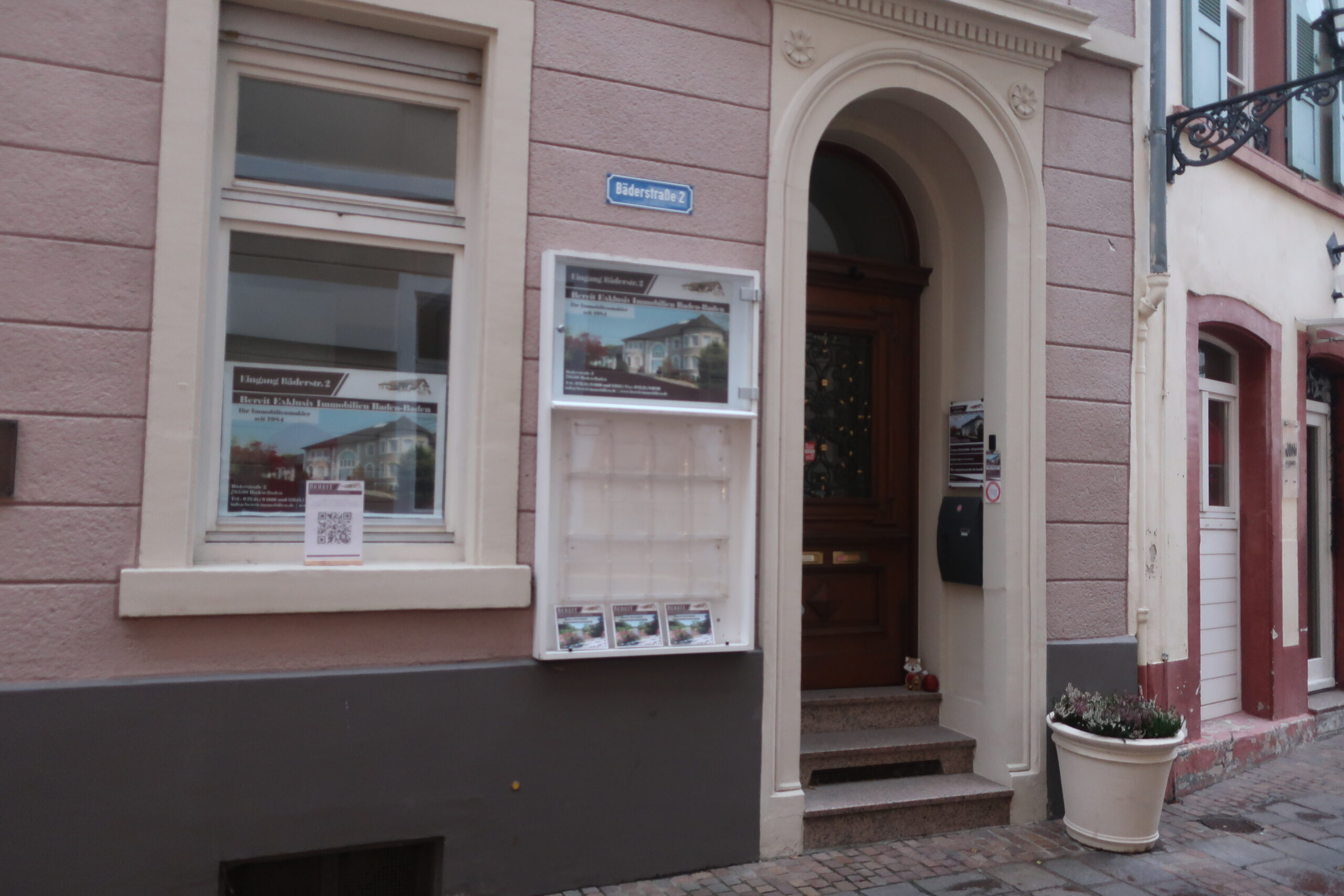Table of Contents
(14) Why I think Dostoevsky and Lady Anna's marriage was predestined - Why did Lady Anna love him and try to protect him?
Previous Article(13) Touring Dostoevsky-associated sites in Baden-Baden, Germany: Walking in one of Europe's most famous recreation areas, famous for its casinos."As I told you in the following section, I experienced the casino on the last night of my stay in Baden-Baden.
Then I went to say my final goodbyes to the statue of Dostoevsky the next morning, just in time to catch my train. For the last time I really wanted to see him.
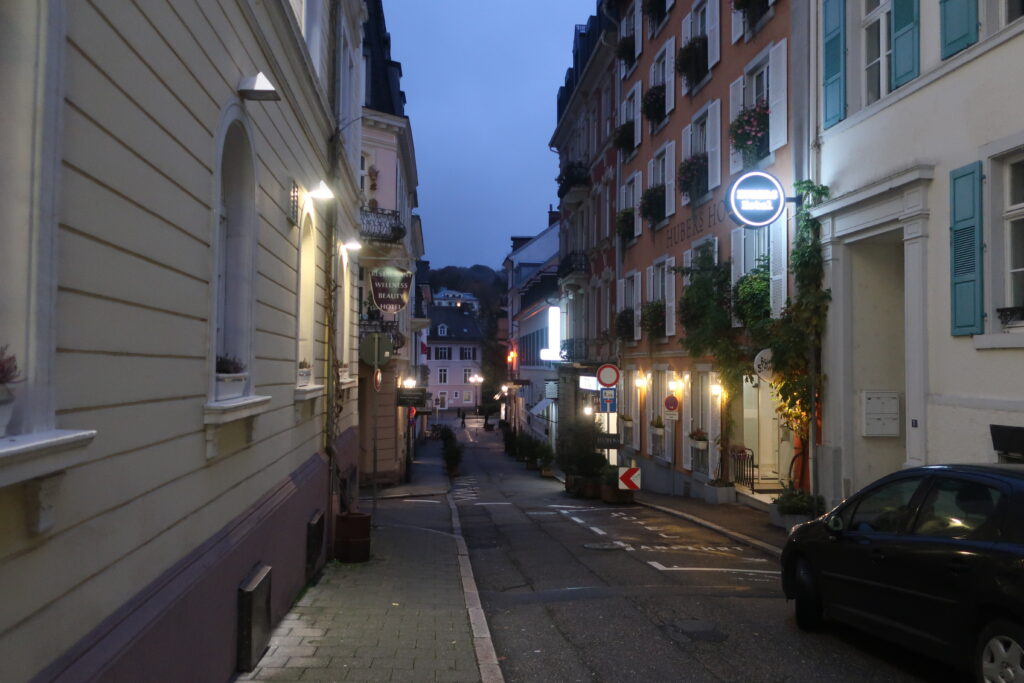
In mid-November, it is dim even after 7:00 a.m.
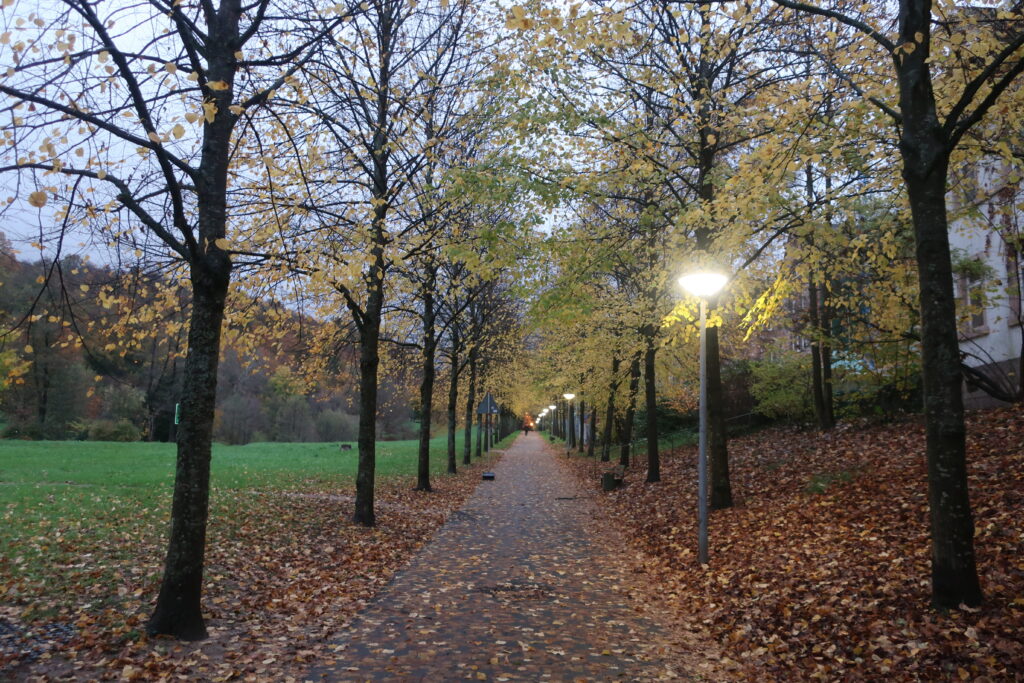
I walked this road for the last time... I walked it almost every day during my stay in Baden-Baden. Some days I walked here twice a day. That is how much I fell in love with the Dostoevsky statue in Baden-Baden.
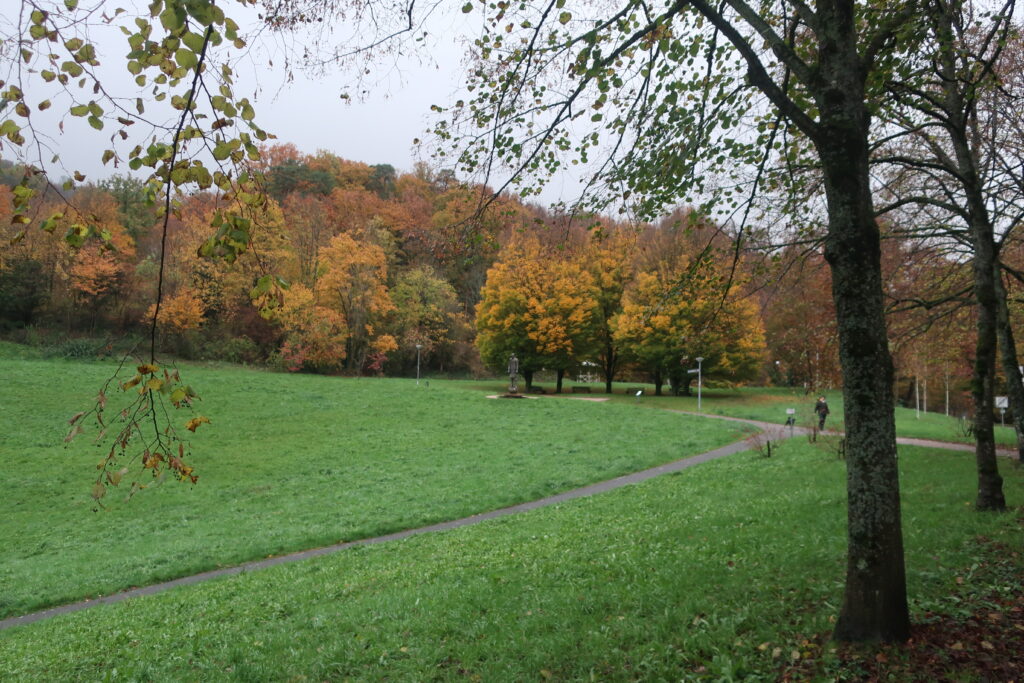
Ah, farewell to this view. A melancholy Dostoevsky. As I said in my last article, this statue is really wonderful. I am writing this travelogue now, but my love for the statue has not changed at all. I can't help but wish to see it again.
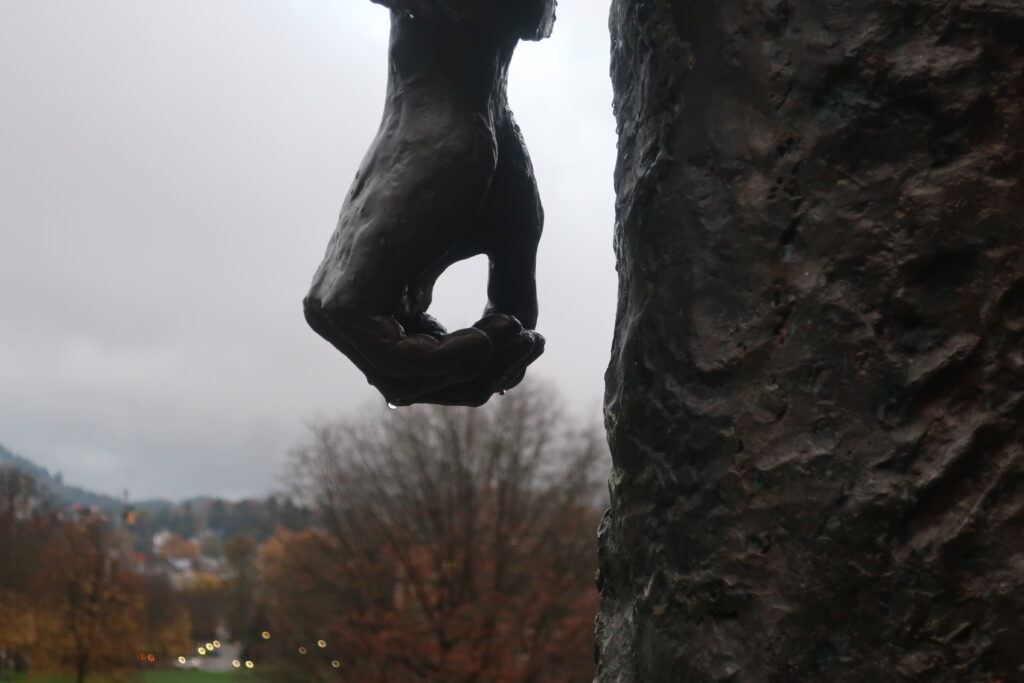
Dostoevsky in the morning dew. For some reason this has left a strong impression on me.
I spent my last hours by Dostoevsky's side looking out over Baden-Baden.
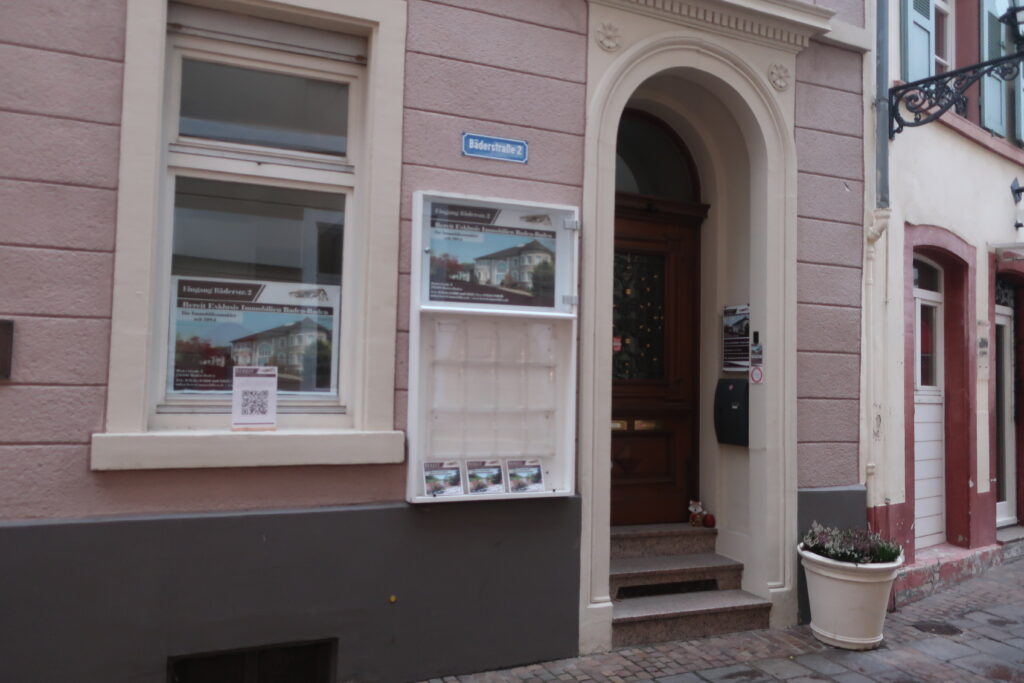
On the way back from the statue of Dostoevsky, we also stopped by Dostoevsky's house. They lived on the second floor of this house. Mrs. Anna was always crying because she was left alone in this house. And then the crazy Dostoevsky would come stumbling back up the stairs. And he takes the money again...
Imagining such a situation, I thought again, "How could Mrs. Anna endure...?
But then it occurred to me.
That's right! Mrs. Anna is...The Gambler.I thought it was that person who dictated the
Not long ago I said to Mrs. Anna, "How can you like someone who wrote such a work?Crime and Punishment."or love for other works, or maybe it was because I fell in love with Dostoevsky's personality," he thought.
But "The Gambler" is not simply a work that ends with gambling madness. The work is about "a man who has finished, a man who has died, and is now playing at resurrection. Madame Anna must have known that. And that Dostoevsky was not merely indulging in gambling, but was betting to put an end to his miserable life. Not only for himself, but even for Mrs. Anna.
Dostoevsky did not originally incur the debt himself. He even took care of his family after his brother's death. Not to mention his stepson Pavel. In other words, he was not unable to repay his debts for selfish reasons. Anna knows this kind of Dostoevsky.
He is tormented by huge debts and has no prospect of repaying them. He is unable to provide for his wife, Anna. He is a scumbag. He is a human being who is finished as a human being. I am sick and old. I want to put an end to such a life. I want to be human again. That's why I play roulette with my life on the line. He was betting his life's revival on that very throw.
But this could be my wishful thinking. This is not fair. It is true that Motylski'sA Critical Biography of Dostoevsky.wellThe "poverty, the cares of how he would spend tomorrow, were merely pretexts. Dostoevsky was absorbed in gambling for the sake of gambling; he loved its vileness, its horror, its sweet pain. His naturalness demanded it - a sense of extremity, a struggle with fate, a sense of doom (p. 353)."It is stated.
In fact, I agree with Motulisky. After all, Dostoevsky is a hardcore maverick. But at the same time, he is a complex man. I would like to think that despite the dominance of these scumbags, there was one aspect of his life that he was betting on to revive his life. I suspect that Mrs. Anna hoped so as well.
In any case, Madame Anna was familiar with the contents of "The Gambler". Perhaps the book served as a vaccine for this kind of gambling mania in Dostoevsky. Perhaps it had the effect of softening the impact of the book, of making one think, "Oh, this is really how it's going to be. If she had been shown this madness in Baden-Baden without knowing anything about it, even Anna would have collapsed from shock.
In that sense, I imagine that dictating "The Gambler" would have saved the day for both of them to some extent.
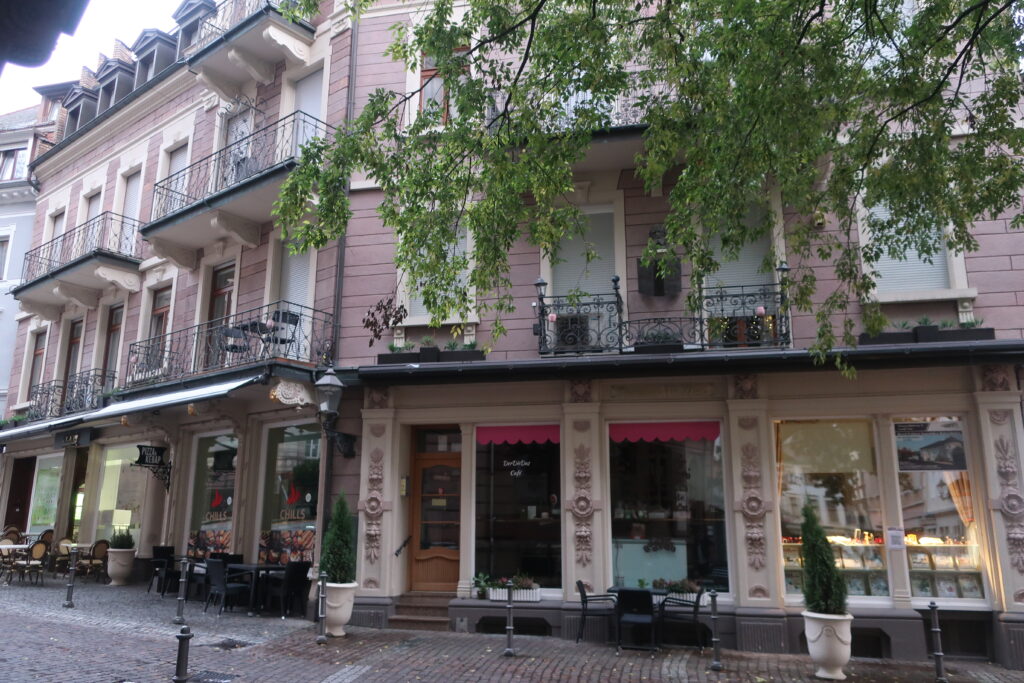
And those of you who have followed this travelogue up to this point may be starting to think that it is time.
But why, then, does Madame Anna love Dostoevsky so much? Why doesn't she run away from him even though he has hurt her so badly?"
That's exactly right. I couldn't help but feel the same way again here in Baden-Baden. I felt it especially strongly when I experienced the casino on the last night and saw the house where Mrs. Anna would have cried and lived the next morning.
However, upon rereading Mrs. Anna's "Recollections," I can only think that their meeting and marriage was fate. I can't help but think that they were meant to meet and fell in love.
In the first half of this travelogue, I introduced the first half of Dostoevsky's life, and now I would like to tell you a little about Mrs. Anna before she met Dostoevsky. The reason why Mrs. Anna loved Dostoevsky so devotedly is actually hidden there. I am sure you will be surprised to know this. And you will be convinced that their marriage was destined.
Mrs. Anna's family environment - parents as a precedent for an older marriage.
Mrs. Anna was born in 1846, her father was a city council and government official and her mother was the daughter of a wealthy merchant.
In fact, the parents were also married at different ages, as was Mrs. Anna. They were married when the father was 42 and the mother was 29. In those days, anyone over 40 years old would be considered "old," but the two hit it off immediately upon meeting and remained on good terms after their marriage. Perhaps watching her parents in this way had a great influence on Mrs. Anna. The age difference between Dostoevsky (45 years old) and Anna (20 years old) was also due to their parents.
Mrs. Anna was a big fan of Dostoevsky because of her father's love of literature.
And one of the main reasons why Madame Anna loved Dostoevsky is that she was a big fan of Dostoevsky in the first place.
On this subject, Mrs. AnnaRecollections."He wrote the following in
One evening, as we were talking, Fyodor Mikhailovich asked me, "What do you think about the "new" school?
Anya, tell me, when did you first realize you loved me?"
I have known the name of Dostoevsky since I was a child. I have been attracted to you, or rather to the characters in your novels, since I was fifteen.
He started laughing. I thought he was joking.
It's true. I am serious. My father loved to read books, and when we talked about contemporary literature, he would always say, 'Well, who are the writers of today? Whenever we talked about contemporary literature, my father would always say, "Well, who are the writers of today? When I was young, it was Pushkin, Gogol, and Jukowski. Among today's young writers, it is Dostoevsky.The Poor.He was the author of He was a real genius. Unfortunately, he got caught up in a political incident and was exiled to Siberia. I haven't heard anything about him since then.
So what must my father's joy have been when he heard that the Dostoevsky brothers were about to launch the magazine "Time" (Vremya)? He said, "The Dostoevsky brothers are back! Thankfully, it was not ruined.
I still remember well that we spent the summer of 1861 in Petergov. Whenever my mother went into town for shopping, my sister and I would ask her to stop by the Cherkessov Library and borrow a new issue of "Time. Our family tradition was old-fashioned, so my father would look at the magazines we borrowed first. My poor father was already frail by then, and after dinner he would often fall asleep on the sofa with a book or newspaper in his hand. I quietly approached him, took the books and ran away to the garden so that he would not be caught. Then I would sit in the shade of the garden and read your novels, unmolested by anyone. But, lo and behold, my sister Masha came over and took the new magazine away from me, saying that she was bigger than me, and that I was the only one who could read it.The Oppressed.I told him to wait until he finished reading a chapter of the book, but he wouldn't listen."
The memories continued. I used to be very imaginative," he said. So the protagonists of my novels were always real people to me. I hated Prince Varkovsky and despised Alyosha because of his weak will. I felt sorry for old man Ihmenyev, and I felt sorry for poor Nerli. I did not like Natasha. ...... You see, the names of the characters in your novels are still fresh in my mind."
I don't remember," he said. And I only vaguely remember the novel," he said.
I was surprised. You forgot? I was attracted to Ivan Petrovich. I was attracted to Ivan Petrovich. He is the narrator of the story. I couldn't understand how Natasha could have chosen the silly Alyosha over this beloved man. As I read the story, I thought to myself, "It's no wonder she is unhappy because she rejected the love of Ivan Petrovich. Strangely enough, I somehow thought of Ivan Petrovich and the author as if they were the same person. It was as if Dostoevsky himself was telling the story of his sad heartbreak. If you have forgotten, you must go back and read this magnificent novel.
Fyodor Mikhailovich was intrigued by my story and promised to read it again when he had time.
By the way, you remember when we first met and you asked me if I had ever fallen in love with anyone. I said, 'Never with a real person. I said, 'Never a real person, but in my fifteenth year, I was drawn to the main character in a novel. He asked me what kind of novel it was, and I hastened to change the subject. I felt uncomfortable mentioning the main character of your novel," she said. I was afraid that she would have taken it as a compliment to a young lady with literary aspirations. I wanted to be completely independent. How I wept when I read "The Record of the House of Death. I was filled with sympathy and pity for Dostoevsky, who had lived a horrible life in prison. It was with these feelings that I came to work for you. I wanted to help the man who wrote the novels I was so crazy about and at least somehow make his life easier. I thanked God that Dr. Oliphyn chose me for your job and not someone else.
But,The Record of the House of Death."I realized that my comment about the "I'm sorry" had put him in a gloomy mood, so I hastened to change the subject and said in a playful tone, "I'm sorry, I'm sorry, I'm sorry.
My destiny was always to be your wife," she said. Since I was sixteen, everyone called me Natechka Nezhwanova. I am Anna, so I am Natechka (Anna's nickname). I used to go to my relatives' house without being called, so unlike other naitchka, I was not called "naitchka nezhwanova" (Dostoevsky has a middle story of the same name; see "Naitchka Nezhwanova" in the "Naitchka Nezhwanova" section). Nezhwanova" means "uninvited"). I loved Dostoevsky's novels, that's why. So please call me Natechka, too," I asked.
No. My Natechka has been through a lot. My natechika has been through a lot of sadness. I want you to be happy. I would rather you call me Anya. I like it that way.
Misuzu Shobo, Anna Dostoevskaya, translated by Hiroshi MatsushitaDostoevsky in Recollection."p87-90
Mrs. Anna's father was a lover of literature and was a strong advocate of Dostoevsky. Under the influence of her father, Mrs. Anna also read Dostoevsky's works and became a great fan.
When I read "The Record of the House of Death," I remember how many tears I shed. I was filled with sympathy and pity for Dostoevsky, who had lived a horrible life in prison. It was with these feelings that I came to work for you. I wanted to help the man who wrote the novels I was so crazy about and at least somehow make his life easier. I thanked God that Mr. Orikhin chose me for your job and not someone else.
My destiny, you see, was always to be your wife.
As Madame Anna herself says, she dreamed of "saving him" even before she met Dostoevsky.
Recollections."andDiary"I always feel that Mrs. Anna is somewhat dreamy and heroic. Moreover, rather than being loved and saved by the prince on the white horse, she seems to have a desire to "help him wherever she can. And it was Dostoevsky who was the object of her desire. The role of saving the plight of the writer whom she had long admired in her heart suddenly fell to her. For a girl who dreams of becoming a writer, one can't help but think that this is fate.
The illness and death of her beloved father brought Mrs. Anna and Dostoevsky together.
And I suspect that the main reason their marriage is doomed is her father's illness and death. Let's hear what "Recollections" has to say.
Sadly, in the summer of 1865, it became clear that my father's illness was not going to be cured and that he was not going to live much longer. I could not bear to leave my precious father in his bed for so many days, so I decided to take a leave of absence from school for the time being. He suffered from insomnia, so I would read him Dickens' novels for hours on end, and it was truly comforting to watch him fall asleep to my low voice reading to him.
In early 1866, it was announced that a shorthand workshop under the direction of Mr. Orihin would be held at the Sixth Boys' Middle School. Since the class was held at night (my father was already in bed at the time), I decided to attend. This was something my father, who was very disappointed that I had to stop my teacher training midway through the course due to my own illness, insisted on. At first, I thought that shorthand was hopeless, and after listening to five or six lectures, I had decided that it was a subject I would never be able to grasp and that I had no idea what it was all about. My father became very angry and scolded me for my lack of patience and perseverance, and made me promise to continue studying stenography. He also told me that I would become a good stenographer. My kind father was not wrong. Thanks to stenography, I was able to find happiness.
On April 28, 1866, my father died. This was the first great misfortune I had ever encountered in my life. My grief was like a storm, and day after day I went to Borishaya Ofta, where my father's cemetery was located, to weep, but I still could not give up on this sad event. My mother was so worried about the severity of my grief that she begged me to get a job. Unfortunately, my shorthand class was already on break, but when the kind Mr. Olihin learned of my misfortune and my repeated absences from class, he agreed to help me correct my shorthand. Twice a week, he would correct two or three pages of the assigned book in shorthand and send it to me, and I would correct it and send it back to him. Thanks to this kind of effort during the three months of summer vacation, my writing improved a lot. In addition, my younger brother, who was home on vacation, allowed me to dictate for more than an hour almost every day, so I gradually acquired speed as well as accuracy. Thus, by the time a new class began in September of 1866, I was the only female student whom Mr. Orihin trusted enough to introduce to his literary work.
Misuzu Shobo, Anna Dostoevskaya, translated by Hiroshi MatsushitaDostoevsky in Recollection."p12-13
In 1865, Mrs. Anna was still a student. It was then that she stopped going to school to nurse her father through a serious illness. Perhaps she could have spent her days at school, but she did not want to be away from her father, even for a moment. But Mrs. Anna did not want to leave her father, even for a moment. Her strong love and devotion to her father may be seen here.
Her father's strong desire was for her to learn shorthand. He was concerned about the future of Anna, who had abandoned her future path and quit school. He must have felt that he had caused trouble for his daughter. He hoped that she would somehow be able to find a job, and this stenography was the answer.
In his strong words when Mrs. Anna was about to give up in weakness, you can see the love of a father for his daughter. And it was because of this father's love that Madame Anna and Dostoevsky met. How touching!
Then, in April 1866, his beloved father never returned.
We saw above how much Mrs. Anna mourned. She must have loved him that much.
Mrs. Anna became a great fan of Dostoevsky under the influence of her beloved father. She also learned stenography through her father's illness and death. These two things made it possible for Mrs. Anna to meet and fall in love with Dostoevsky.
Even before they married, the difficulties of married life, such as Dostoevsky's difficult temperament, debts, and illness problems, were to be expected. Nevertheless, this was the background behind his decision to marry Dostoevsky. It was such a miraculous encounter that it could only be fate.
In this light, it is no wonder that Mrs. Anna did not run away even during the hellish days of Baden-Baden.
Mrs. Anna wanted to save her beloved husband Dostoevsky, a great writer whom she respected, from suffering. This desire must have been especially strong for Mrs. Anna, who had lost her beloved father.
I have a quote from Madame Anna's diary that I will never forget. This is a description of a casual day in Dresden.
We were home for a long time. He would read and I would lie on the couch, leaning on his back (his back is my favorite place. My father used to do this to me when I was a kid).
Kawade Shobo Shinsha, Anna Dostoevskaya,Translated by Toyofusa Kinoshita'TheMrs. Dostoevsky, The Diary of Anna.p18
Mrs. Anna sees in Dostoevsky the image of her father...The presence of her late beloved father must have been so significant to her.
I can't help but think that the presence of this father had a great influence on Mrs. Anna's love for Dostoevsky.
The image of his beloved father fading away before his eyes. And his feelings for his father, who connected him to Dostoevsky.
Anna wanted to somehow save Dostoevsky, who was suffering right in front of her eyes. She wanted to believe that Dostoevsky, the man of her dreams, would come back to life and be active again. I can't abandon him now. Only I can save him. Such a thought must have supported Mrs. Anna at the very last moment.
That is why this four-year journey is so dramatic. It is precisely from this rock bottom that Dostoevsky has risen. A miracle had occurred. Anna's prayers were answered. Their marriage was destined, after all. I can only think so.
The next article will introduce the city of Basel, the next stop for the two men after leaving Baden-Baden, where they spent these hellish days. Here, Dostoevsky was shocked to see Holbein's painting "The Dead Christ in the Tomb.
be unbroken
Next Article.
Click here to read the previous article.
Click here for a list of Dostoevsky's recommended books.
List of recommended Dostoevsky biographies."
List of recommended Dostoevsky commentaries.
A list of recommended commentaries on "Dostoevsky and Christianity."
Related Articles











